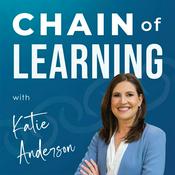Many major transformations, including lean and sustainability—don’t stall because leaders don’t care. They stall because of an execution gap: the gap between what organizations say matters and what actually shows up in daily work, decisions, and priorities.
When you hear the word sustainability, what comes to mind first?
If it’s recycling, you’re not alone.
But sustainability is far bigger—and more complex—than end-point solutions that address the symptoms of deeper problems. As this episode reveals, sustainability efforts—are stuck in the execution gap between intent and action.
In this episode of Chain of Learning, I’m joined by Rose Heathcote, sustainability expert, lean adviser, and author, to explore sustainability as a leadership and transformation challenge, not just an environmental one.
Together, we discuss why sustainability often lives in strategy decks and slogans, but struggles to take root in everyday work, and how leaders can shift their focus upstream to close that gap: to how work is designed, how problems are framed, and how people learn to see new kinds of waste and impact.
This conversation goes beyond sustainability to address a pattern that shows up in any transformation—lean, AI-enabled change, or building a people-first learning organization.
If you’re working to close the gap between intention and execution, this episode offers perspective and practical starting points for leading meaningful change that lasts.
You’ll Learn:
What sustainability really means—and why it’s often treated as an aspiration instead of embedded in daily work
What the sustainability execution gap is, and why it mirrors lean and culture-change failures
Why shifting problem-solving upstream—from symptoms to root causes—is critical for creating lasting impact
How lean thinking and problem-solving skills enable sustainability and organizational transformation when paired with influence and change leadership skills
Why speaking the language of business matters for gaining leadership buy-in—and how AI can be used as a thinking partner to support systems thinking and better decisions
ABOUT MY GUEST:
Rose Heathcote is a speaker, adviser, and Chartered Environmentalist who works at the intersection of Lean thinking and sustainability. She is the founder of Thinking People and the author of "Green Is the New Gold." With decades of experience supporting organizations across industries and regions, Rose focuses on helping leaders move sustainability from aspiration to everyday practice through systems thinking, problem-solving, and people-centered change.
IMPORTANT LINKS:
Full episode show notes with links to other podcast episodes and resources: ChainOfLearning.com/63
Check out my website for resources and ways to work with me KBJAnderson.com
Connect with Rose Heathcote: linkedin.com/in/rose-heathcote
Follow me on LinkedIn: linkedin.com/in/kbjanderson
Download my free KATALYST™ Change Leader Self-Assessment: KBJAnderson.com/katalyst
Learn more about Rose’s book, “Green is the New Gold”: https://payhip.com/b/UtreT
Learn more about my Japan Leadership Experience: kbjanderson.com/japantrip
TIMESTAMPS FOR THIS EPISODE:
01:04 Why the real challenge with sustainability starts with where the conversation begins
02:39 A broader definition of sustainability meeting the needs of people, planet, and future generations
04:16 Why people mistake sustainability for “recycling”
05:54 The execution gap lean leaders keep running into
07:43 A real-world example: when “people first” and sustainability don’t show up in the metrics
09:58 Important shifts leaders must make to close the execution gap
11:26 Seeing waste, energy loss, and impact through a green lens
14:06 Using AI as a thinking partner, not a replacement
15:16 The skills leaders must develop in an AI-driven world
16:41 How multidisciplinary thinking led to a smarter, more sustainable solution
19:19 Why sustainability requires systems thinking across the value chain
20:23 How to make progress towards big challenges
23:05 The meaning of the Japanese concept, “sanpo yori” and “yanpo yori” for goodness in four ways and happiness for the long term view
24:33 How the book “Green is the New Gold,” came to be
27:10 Three ways to build better products and be more efficient while reducing impacts on the planet
29:19 What we are doing well as a global community to make improvements towards sustainability
31:31 How to broaden your lens and use what you already know to do more good
32:35 Practical first steps lean leaders can take to apply a sustainability lens at work
34:29 Why productivity alone doesn’t reduce damage to the environment
36:45 A simple reflection on looking upstream to improve sustainability



